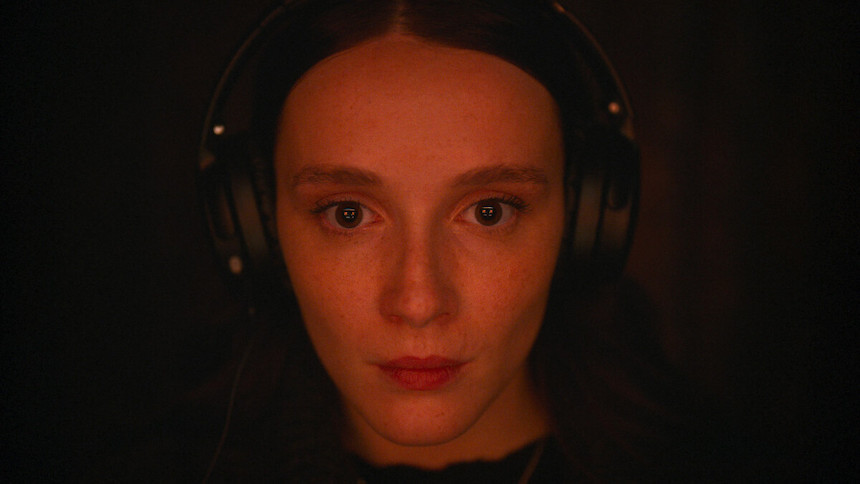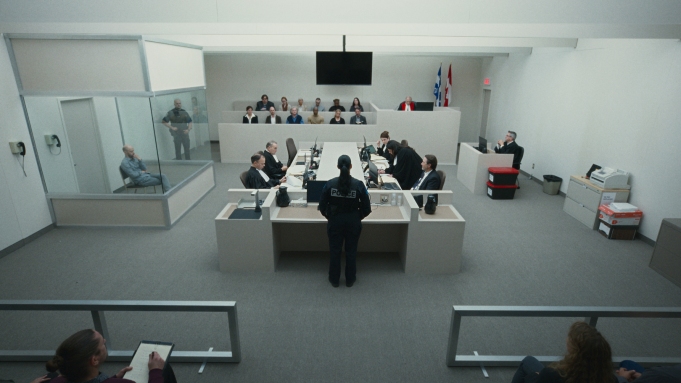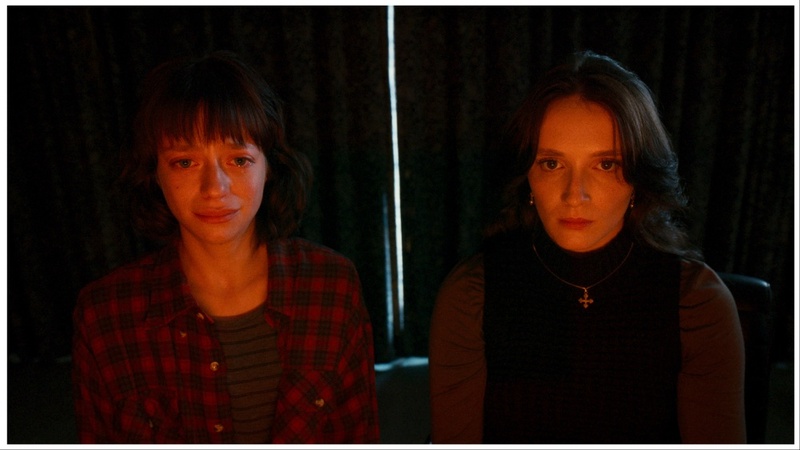Karlovy Vary 2023 Review: RED ROOMS, Unsettling Snuff Cyber Thriller Revamps Serial Killer Genre Through Female Lens
Quebec's own Pascal Plante directs a genre-blurring cyber thriller that unflinchingly delves into the dark world of morbid fascination, surveillance capitalism, and voyeurism.

Quebec filmmaker Pascal Plante, known for Fake Tattoos and the critically hailed Nadia, Butterfly, shifts his creative gaze to darker territories in his latest offering, Red Rooms. Debuting in the Crystal Globe competition at Karlovy Vary, Red Rooms provides an intriguing spin on the ubiquitous serial killer genre.
The story orbits around tech-savvy Kelly-Anne (Juliette Gariépy), a seemingly successful woman with a semi-professional modeling career and a knack for online poker. Yet, her societal image is marred by her unwavering fascination with serial killer Ludovic Chevalier (Maxwell McCabe-Lokos), aka the Demon of Rosemont. Kelly-Anne's obsession appears to verge on pathological, as she attends his court proceedings with keen interest.
The film introduces Chevalier not as an active player but a fringe element, his gruesome deeds serving as the narrative fulcrum. Kelly-Anne has become a serial killer groupie, unhealthy in her fascination with the perpetrator and the crimes, which include abductions, torture, sexual abuse and murder of underage girls for anonymous, wealthy, sadistic spectators.
And her kink throws her carefully orgnaized life into a downard spiral on the verge of psychosis. Meanwhile Chevalier, portrayed as a pitiful caricature by McCabe-Lokos, remains more as a backdrop for the real drama unfolding between Kelly-Anne and the victims' families.
Plante bucks genre expectations from the get-go, commencing with a drawn-out courtroom scene where Vincent Biron's camera pans around the room, capturing the reactions of all parties involved, from the prosecution to the shocked families. In doing so, Plante ensures the film begins not as a crime thriller but as a psychological drama. The narrative then subtly transitions from the courtroom to Kelly-Anne's personal life, revealing a protagonist adept in online poker and dark web exploits.
The director subverts conventional expectations by dedicating the film's first act to building a courtroom case against the child killer. This unique storytelling approach eschews typical genre structures, steering the narrative towards a psychological drama. The narrative focus shifts, concentrating on the reactions and mental states of Kelly-Anne and the surviving family members.
Plante relegates Chevalier to the periphery, allowing his horrific crimes to communicate his character and act as emotional triggers for both the protagonist and the victims' families, who must endure repeated recounting of the atrocities inflicted on their daughters. A mounting psychological tension becomes evident between Kelly-Anne and the mother of one victim, with Kelly-Anne evolving into an emotional tormentor.
In fact, the film partly delves into Michael Haneke's social horror realm, staging a collision between two starkly contrasting worlds. It presents two female perspectives that, by virtue of motherhood and empathy, should align, but instead exhibit a stark and even perverse contrast.
In the film's second act, Plante delves deeper into Kelly-Anne's enigmatic private life. The tech-savvy protagonist, adept at online poker and navigating the dark web, encounters a new character, the naive Clementine (a doe-eyed Laurie Babin), another groupie, penned by Plante himself. Despite originating from the same sphere, their worlds collide, highlighting the distinct boundaries within the sisterhood of the child killer's followers, as Clementine discovers her own limits.
Kelly-Anne's character soon reveals a darker truth – she's not merely a fan, but a sociopath. Plante seamlessly transitions from the courtroom drama to a surveillance thriller, depicting the protagonist's deft exploitation of online vulnerabilities. This allows her to encroach upon the lives of the victims' families, breaching yet another layer of psychological and social boundaries.
Red Rooms seamlessly weaves together elements from a spectrum of genres, including home invasion, but Plante intriguingly never ventures into the eponymous red room. Instead, he leans towards the arthouse style, substituting gore for psychological and social horror.
The director, much like his protagonist, cleverly exploits the gray areas within the arthouse thriller genre. This manipulation is made evident through the character of a bereaved mother, Francine Beaullieu, powerfully portrayed by Elisabeth Locas. Her raw, intense performance is deeply rooted in social drama, further blurring the line between horror and drama.
Plante's film serves as a riveting fusion of arthouse thriller that resonates in an era marked by morbid voyeurism and surveillance capitalism. The narrative begins with a dissection of the serial killer trope, evolving into a women-centric psychodrama. It challenges gender norms while adeptly channeling the essence of chamber social horror, all executed with a distinct flair.
The film enjoyed its world premiere at the Karlovy Vary Film Festival.
Red Rooms
Director(s)
- Pascal Plante
Writer(s)
- Pascal Plante
Cast
- Juliette Gariépy
- Laurie Babin
- Elisabeth Locas









